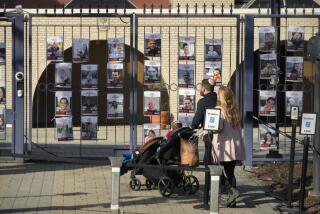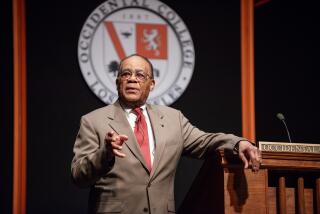Robert Oakley dies at 83; diplomat mediated in ‘Black Hawk Down’ turmoil
Ambassador and diplomat Robert Oakley had retired from diplomatic service, twice, when he got an emergency phone call in 1993 while at a party. Could he come to the White House early the next morning?
Oakley, known as an unrelenting trouble shooter, was asked to take on one more assignment: go to Somalia and gain the release of a U.S. helicopter pilot captured during what came to be known as the “Black Hawk Down” firefight.
“They knew he was the man to do it,” his wife, Phyllis Oakley, said this week. “And they knew Bob would say ‘yes.’”
Robert Oakley, 83, who served in trouble spots around the world during a nearly four-decade career, died Dec. 10 at a nursing home in McLean, Va. He had been suffering from a Parkinson’s-related disorder, his wife said.
Except for a stint in Paris, his only European assignment, Oakley did not get the relatively cushy postings. His resume included three ambassadorships — to Pakistan, Zaire and Somalia — plus time in Vietnam (during the war), Afghanistan, the Sudan and Lebanon.
“He didn’t wind up in places like Copenhagen, if you get my drift,” Chester Crocker, former assistant secretary of State, said in a 1993 Times interview.
But the lanky Oakley, who spoke with a Southern drawl, was drawn to difficult situations and approached them with a rare directness. “Bob is quite the opposite of the stereotyped view of Foreign Service officers so concerned with their careers that they pull their punches,” said Sam Lewis, former ambassador to Israel.
“Bob has never pulled a punch.”
Robert Bigger Oakley was born in Dallas on March 12, 1931. When he was about 5, his family moved to Shreveport, La.
For high school, Oakley went to South Kent boarding school in Connecticut. “Their motto was, ‘Simplicity of life, directness of purpose,’” Phyllis Oakley said. “Bob lived by that all his life.”
In 1952 he graduated from Princeton University, where he studied philosophy and history, and then served in the Navy until 1955, mostly in Japan where he did work in naval intelligence.
He briefly attended graduate school at Tulane University, but left to begin his Foreign Service career.
Of all his postings, he is most identified with Somalia, located on the Horn of Africa bordering Ethiopia and Kenya. He was first posted there as ambassador from 1982 to ‘84, and though he retired from the Foreign Service in 1991, he returned to Somalia the next year for a humanitarian mission at the request of his friend, Colin Powell, then chairman of the Joint Chief of Staffs.
At that point Somalia was ripped apart by fighting among warlords, and ordinary citizens were struggling to survive.
“Television was on it,” he said in a 1998 interview for the “Frontline” PBS series. “You saw hundreds of thousands of people dying slowly of starvation [and] disease caused by a combination of famine, drought and civil war.”
He quickly met with representatives of the two major warring warlords, careful not to take sides. “All we’re trying to do is change the environment here and teach them that they can cooperate with each other,” he told the Chicago Tribune. “If we can change that, then this great white bwana can go home.”
After about two months, Oakley secured agreements that allowed U.S. Marines — bearing critically needed aid — to land in the country. He also made it clear that U.S. forces would fight back if attacked. Though some violence continued, Oakley was credited with creating conditions that nearly eradicated starvation, and he returned home.
Then came the battle of Oct. 3, 1993. It began with what was supposed to be a quick mission by elite U.S. forces flying high-tech Black Hawk helicopters into the capital of Mogadishu. But warlord gunmen caught them in an ambush and in the ensuing firefight, 18 Americans were killed and 73 wounded. One of the dead soldiers was dragged through the streets, and a wounded pilot, Michael Durant, was captured.
Americans were outraged and Oakley was sent by President Clinton to get Durant back, without conditions. In Mogadishu, he met representatives of Durant’s captors. “I guarantee you we are not going to pay or trade for him in any way, shape or form,” he said, as quoted in Mark Bowden’s bestselling 1999 book about the firefight, “Black Hawk Down,” that was made into a 2001 film.
Oakley then explained what would happen if Durant was not released. “This whole part of the city will be destroyed, men, women, children, camels, cats, dogs, goats, donkeys, everything.”
Less than a week later, Durant was set free, and Oakley finally retired from the Foreign Service for good.
In addition to his wife, Phyllis, who was also in the Foreign Service and served twice as an assistant secretary of State, he is survived by a daughter, Mary Kress of Falls Church, Va.; son Thomas Oakley of McLean; and five grandchildren.
Twitter: @davidcolker
More to Read
Start your day right
Sign up for Essential California for the L.A. Times biggest news, features and recommendations in your inbox six days a week.
You may occasionally receive promotional content from the Los Angeles Times.







